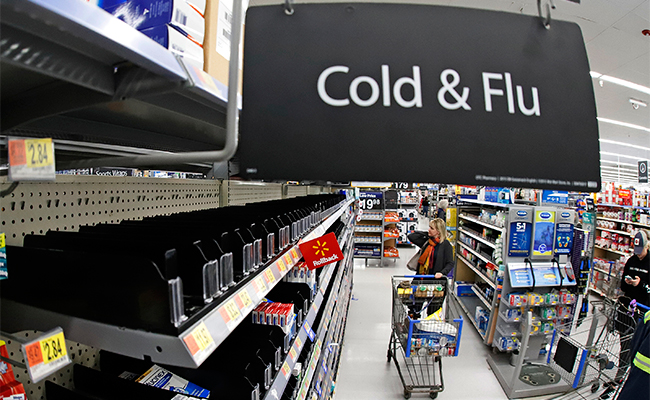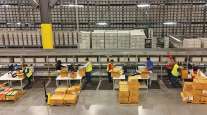Senior Reporter
Economists Eye Possible Recession Caused by Coronavirus

[Stay on top of transportation news: Get TTNews in your inbox.]
Economists and other experts who watch the U.S. economy on a minute-by-minute basis are now suggesting, some loudly, that the nation is lurching towards a recession, as the coronavirus damages the economy.
“The impact is significant on the U.S. economy. Already, some economic forecasters are expecting a decline in gross domestic product during the second quarter. What we don’t know is how long this health crisis will last,” ATA Chief Economist Bob Costello said. “If it is short-lived, we might be able to skirt a recession. But if this continues for the next few months, it is likely the economy will contract for at least a quarter.”
On March 13, economists at JPMorgan said the economic picture has “evolved dramatically in recent weeks” as the outbreak has spread further around the world, and it’s forecasting the economy could shrink by 2% in the first quarter and another 3% in the second.
“As we resign ourselves to the inevitability of a large and broad-based shock to global growth, the key issue is whether we can avoid a traditional and longer-lasting recession event,” JPMorgan wrote.
A recession is technically defined as two consecutive quarters of negative gross domestic product growth.
“If we shut down all of the hospitality industry at this point, it means that the next three months, well, you can write it off,” the director of the Economic Forecasting Center at Georgia State University, Rajeev Dhawan, told Transport Topics. Ohio and Illinois ordered the statewide closure of bars and restaurants March 15.
“The next two weeks will tell us what happens if we turn around and we don’t become like Italy,” Dhawan said.
Italy and now Spain have put their nations on virtual lockdown due to the continued spread of the coronavirus, which has left more than 1,800 dead as of March 15 and more than 21,000 ill. In the U.S. there are more than 2,900 positive results in 49 state, Vice President Mike Pence said March 15. There have been more than 50 deaths in the U.S. as of March 15.
The implications for the coronavirus on the transportation and trucking industries are already proving to be significant.
Several major grocery store chains, including Walmart, Harris Teeter, Publix, Kroger and HEB are reducing store hours so their employees can restock sold-out stores as millions of Americans rush to purchase groceries and other critical items.
Beginning March 15, many of Walmart’s more than 4,700 U.S. stores will be open from 6 a.m. to 11 p.m. until further notice. The Bentonville, Ark.-based retailer said employees will keep their regular daytime or evening shifts.

Shelves are nearly empty in the cold and flu aisle of a Walmart near Warrendale, Pa. (Gene J. Puskar/AP)
“This will help ensure associates are able to stock the products our customers are looking for and to perform cleaning and sanitizing,” Walmart COO Dacona Smith said in a statement. “Stores currently operating under more reduced hours (for example they regularly close at 10 p.m. or open at 7 a.m.) will keep their current hours of operation.”
So far, White House officials believe the critical supply chains are holding up well. “Most of our supply lines are working pretty well in the domestic United States … there’s a huge economic challenge here, don’t get me wrong — on the other hand, most of America is still working,” Economic Adviser Larry Kudlow said on CBS News. But he added, “The employment story may become more tenuous in the weeks ahead.”
In order to keep supply chains open, the Federal Motor Carrier Safety Administration announced on March 14 it is granting hours-of-service exemptions for drivers delivering critical items related to the coronavirus outbreak.
Government officials made a move to reduce capacity tightness that could occur during the coming weeks and possibly longer, as millions of Americans stay home to prevent the spread of the illness.

Costello
Costello says he’s watching the labor situation carefully, primarily because before the coronavirus pandemic began, the job picture remained strong.
Businesses, including the trucking industry, have spent the last several years struggling to attract and keep workers, and Costello says those companies may be reluctant to lay off workers, especially if the economy rebounds as fears of the coronavirus spreading began to wane.
“In the weeks ahead, I’m going to be watching the weekly initial jobless claims for the first indications that the economy is slipping,” he said. “Because the labor market has been so tight, businesses may be reluctant to lay off workers if they might be needed in a couple of months. However, if initial jobless claims start to spike in the weeks ahead, it will be one of our first signals that there are problems in the job market.”
Georgia State’s Dhawan believes the trucking industry is well prepared to resupply stores and help keep hospitals operating during the crisis. Still, he says the economy is going to take a hit.
“The shortages can happen in April and May, that’s the next problem, after the social distancing we’re doing this month and the next month, which will probably help stem this hurricane we’re in. The sooner we do the social distancing, the better it is.”
Want more news? Listen to today's daily briefing:




